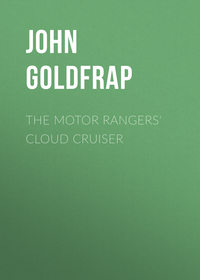 полная версия
полная версияThe Dreadnought Boys on Battle Practice
What happened then occurred so quickly that the jackies who watched it said afterward that all they saw was Herc's body shooting downward with a despairing cry, and a second later another flash, as his chum's form dashed through the air and entered the water close by the place of Herc's disappearance with a loud splash.
Instantly the startling cry of "Man overboard!" echoed from mouth to mouth along the decks of the Dreadnought.
CHAPTER IX.
A NAVAL INITIATION
Both the Dreadnought Boys were good swimmers. Even if they had not been drilled in this art at the training school, their experiences in the old swimming pool at home would have made them at home in the water. Ned had dived after his chum as a matter of impulse, more than anything else, and, a second after the two splashes had resounded, both boys appeared on the surface of the water.
A few strokes brought them to the side of the ship, where they clung to the slight projection afforded by an out-board seacock, till a ladder came snaking down to them.
By this time the rail, which seemed to be as high above them as the summit of a skyscraper, was lined with faces, and at the stern the officers who were on board were peering over the side of the quarterdeck.
Captain Dunham himself, summoned by his orderly, came running from his cabin, as the two dripping youths arose from their immersion, and joined his officers on the stern. He had just come on board in his own launch.
"Who are they, Scott?" he asked of his executive officer, as the boys once more ascended the side of the ship on the emergency ladder.
"Two recruits, sir, from the training station, I believe, sir," was the reply, with a salute.
"Well, they are certainly taking a naval baptism," laughed the captain, whose merriment was echoed by his officers, now that it was seen the boys were safe, "but how did it happen?"
"I don't know, sir. I was not forward at the time," was the rejoinder. "The shore men were coming on board, I believe, and the red-headed young fellow fell from the boom. His companion dived instantly after him. It was a plucky act, sir."
"Humph!" remarked the captain. "I suppose it was an accident, and we can take no official notice of it. By the way, Scott, those two young men, I perceive now, are the ones I spoke to you about as having behaved with such singular courage and cool-headedness when the Rhode Island burned. Keep an eye on them, for I think they have the makings of real sailors in them."
"I shall, sir," replied the executive officer, saluting, as the captain turned away with a return of the courtesy.
If Ned and Herc were wet and cold without, they were warm enough within as they gained the deck. Ned's eye had detected Kennell's foot in the act of reaching out to trip his chum and cousin, and he felt within him an overpowering desire to seek the man out and demand an explanation.
Fortunately, however, for himself, other matters occupied his attention at that moment.
Dripping wet as they were, the boys did not forget their carefully instilled training, and each came to attention and saluted as they faced the officer of the deck.
"Who are you men?" demanded that dignitary, red tape not allowing him to comment on the accident.
"Recruits, s-s-sir, from Newport T-T-T-Training School," answered Ned respectfully, his teeth chattering.
"Get on dry clothes and report to the master-at-arms. Messenger!"
A messenger slid to the officer's side with a hand raised in salute.
"Show these recruits to their quarters. Let them get on dry clothes and then conduct them to the master-at-arms."
As the boys' suitcases had by this time been hoisted on board, they soon changed into dry uniforms in the men's quarters forward, and their conductor then beckoned them to follow him. The two boys, their eyes round with astonishment at the sights and scenes about them, followed without a word, and were led through labyrinths of steel-walled passages, down steel ladders with glistening steel hand rails, up more ladders, and through bulkhead doors made to open and close with ponderous machinery. The lower decks of the ship were lighted with hundreds of incandescent bulbs, as, in a modern man-of-war, there are no portholes on the sides, owing to the thickness of the armorplate. The officers' cabins are lighted by lozenges of glass let into the deck.
"It's like living in a fire-proof safe," whispered Herc.
The boys noticed that, although they seemed to be in a steel-walled maze, that the air was fresh and cool, and they discovered afterward that large quantities of fresh ozone were distributed into every part of the ship by electric blowers. For the present, however, they followed their guide in a sort of semi-stupefaction at the novelty of their surroundings.
"Say, we must have walked a mile," gasped Herc, as their guide finally emerged into a narrow passage seemingly in the stern of the vessel. He paused before a door hung with heavy curtains and knocked.
"What is it?" demanded a voice from inside. "A voice as pleasant as an explosion of dynamite," Herc described it afterward.
"Two recruits, sir," was the reply.
"Send them in."
The boys found themselves in the presence of the master-at-arms, a dignified and business-like officer.
"Your papers?" he demanded, without further parley.
"Here, sir," answered both boys, producing their precious certificates from the training school.
The master-at-arms glanced over them.
"You seem to have good records," he remarked, "but don't presume on them. You have a lot to learn. Messenger!"
The messenger sprang to attention and saluted, and the boys, not to be outdone in politeness, did likewise.
"Sir!"
"Take these two recruits to the ship's writer, and have him enter them in the ship's records."
Once more the threading of the metal labyrinth began, and the boys felt almost ready to drop as they were ushered into another cabin, where sat a man not unlike the master-at-arms in appearance, but who wore spectacles perched on his nose.
He took the boys' papers without a word and filed them away in a pigeonhole. He then produced two varnished ditty boxes, with their keys, which he handed to the boys.
"These are your ditty boxes," he remarked, handing over the caskets, which were about a foot and a half square, neatly varnished and finished, and each of which bore a number.
"You are to keep your valuables, stationery and knicknacks of any kind in these," he said. "Be careful of them and look after them well."
"What about our money, sir?" asked Ned.
"You can place that in the ship's savings bank if you wish. It gives four per cent. Or, if you prefer, you can deposit it with the ship's paymaster, and draw on it as you require. If you are transferred to another ship, it will be transferred for you."
"I think the savings bank would be best," said Ned, looking at Herc.
"Same here," replied the farmboy; "gran'pa used to say, 'put your money in hogs,' but I guess we couldn't do that aboard ship, so it's the savings banks for me, too."
"Very well; you may leave your money with me and I will give you a passbook. You see, we do these things much as they are done ashore."
"I see," nodded Ned as he took his passbook, and Herc did the same, "what do we do now, sir?"
"You will now be conducted to the boatswain's mate, who is a sort of foster-parent to young recruits, and from him you will get the numbers of your hammocks and be assigned to a place at mess. He will also outline your duties to you.
"Messenger!"
"Sir!"
Once more the messenger came to salute, and stiffened in the attitude of attention, and the boys did the same.
"Conduct these recruits to the chief boatswain's mate."
"Yes, sir."
"Off again," whispered Herc, as the messenger once more darted off with the boys in tow.
CHAPTER X.
NED HOLDS HIS COUNSEL
The chief boatswain's mate was a far more awe-inspiring officer, in the boys' eyes, than any they had so far met. They both knew enough of the navy to realize that he and his subordinate were the class of petty officer with whom they would come most in contact during their early period of enlistment.
This dignitary on the Manhattan was a fierce-looking personage, but the boys were to learn that as the sailors say, his "bark was worse than his bite."
"Hum, recruits," he said as he looked the two boys over.
"He certainly is giving us a sizing-up," whispered Herc.
The ears of the boatswain's mate were sharper than the boys had imagined.
"Yes, I am sizing you up," he said with emphasis. "I'm thinking that you look like pretty good material."
"We mean to do our best, sir," rejoined Ned.
"That's right. That sort of ambition will carry you far. But are you not the two boys who fell overboard a short time ago?"
"I fell, and he jumped after me," corrected Herc.
"How did it happen? An accident, wasn't it?"
"Not exactly an accident," rejoined Ned.
"What then? You mean it was done on purpose?"
"I'm afraid so," was the quiet reply.
"Who did it?"
"We would prefer not to say now, sir," replied Ned in the same repressed tone.
"You mean you intend to attend to the matter in your own way?"
"Something like that," admitted Ned.
The officer looked sharply at him.
"It is my duty to warn you, my lad, that all such matters should be confided to your superior officer, and you should abide by his advice. However, unless you commit some breach of discipline, I have no concern in the affair. I must tell you, however, that I heard from some of the men that Kennell had something to do with it. Is he the man you suspect of causing the trouble?"
"I had rather not say," rejoined Ned quietly.
"Very well, as you wish it; only recollect what I have told you. Now, follow me, and we will look over your quarters. Of course, you are familiar with hammock-slinging, and all that appertains to it?"
Herc rubbed his head with a grin.
"I've got some bumps here yet that serve to remind me of my first efforts to climb into one."
"Answer me 'yes' or 'no,' please; do not try to say anything more."
"I was just explaining," muttered Herc, not heeding Ned's warning look.
They were soon assigned two places, side by side, in which they might sling their hammocks. The space devoted to the jackies' sleeping quarters was well forward under the superstructure and lighted by electric lights. It was well ventilated, and aisles of steel pillars ran in every direction. From these the hammocks were slung.
"I will now show you something of the ship, so that you may be familiar with your floating home," said the boatswain's mate; "follow me."
"I wish he'd show us some supper," whispered Herc. "I'm about as empty as a dry well."
"Never mind," rejoined Ned; "we shall soon be summoned to eat, I expect."
The boatswain's mate took them through much the same maze of steel-walled passages and heavy doors as had the messenger. After descending three decks and traversing the stern of the ship, they were shown the mighty tiller and the mechanical apparatus connecting with the wheel-house, where the steam-steering gear was installed. Then they were hurried along forward. Not, however, before the officer had shown them the emergency steam-steering gear, far below the water-line, which could be used in case a shot disabled the guiding apparatus above decks.
Forward they were conducted up steel steps onto the gun deck, and thence to a passage under the bridge and chart room, from which they emerged onto the edge of a sort of steel "well," sunk immediately below the center of the bridge.
"There are the fire-controls," said the officer, pointing down into the "well" at a lot of shapeless apparatus swathed in heavy, waterproof cloth. "We keep the range-finders and other apparatus covered while we are in port or in a damp climate."
"The fire-controls?" echoed Herc, with half a suspicion that his unfortunate head was coming in as the subject of more joking. But it was not, as the next remark of the boatswain's mate showed him.
"The gunnery officer is seated in that well, with two orderlies, at battle practice, or in actual warfare," he explained. "He is screened there from the enemy's fire; but, through narrow slits cut in the steel, he sees what is going on about him, and telegraphs the range and directs the fire. His commands are transmitted to the gun-control room electrically, and thence to the turrets."
The boys listened with deep interest.
"We will now go below again and look at the gun-control room," said the boatswain's mate, as he trotted off once more.
"He must be made of the same material as the ship," groaned Herc, as the two boys followed him.
As before, they traversed innumerable passages, passing several officers on the way, whom they, of course, saluted. In each case the salutation was returned by a brief touch of the officer's fingers to his cap rim.
"If you'd ever get lost here, you could wander round for a week without finding your way out," grumbled Herc.
"Not much chance," laughed their guide; "every part of the ship, huge as it is, is visited at least once a day by some officer. Not a corner is allowed to escape notice."
Suddenly the boatswain's mate plunged downward through a very narrow square opening, which seemed almost too small to admit his body.
The boys followed, though for a moment they had been quite startled at his sudden disappearance.
"This is a part of the ship no stout man can ever hope to penetrate," said their guide, as he clambered down a steel ladder, which the opening, through which he had crawled, led to.
"I should say not," muttered Herc, squeezing through. "It doesn't speak very much for navy food," he added to himself, "if all the sailors can squeeze through such a place as this."
At the bottom of the ladder they found themselves in a small chamber, looking not unlike the central office of a telephone exchange. It was quite hot, owing to its proximity to the boiler room.
Everywhere wires ran, with head-pieces, like those worn by operators, dangling from them. Small bells were affixed to the steel bulkhead, and a system of tiny signal lights was arranged above them.
"This is the place from which the fire is directed after the commands have been sent from the fire-control well," explained their guide. "As you see, it works like a telephone exchange. In action, an officer and four men are stationed here to attend to the signals."
"Are we under the water-line now?" asked Ned breathlessly.
"We are now twenty feet below the surface of the river," replied the boatswain's mate.
"Then, if the ship was sunk in action, the men down here would not stand a chance to escape?" queried Ned.
"No; they probably would not know that the ship had been struck till they saw the water come pouring in on them."
"Say, Ned," whispered Herc.
"What?"
"There's one job in the navy that I don't want."
"What is that?"
"To be stationed down here."
"No danger of that," laughed Ned. "Only the most expert of the crew – men to whom gunnery is a science, are assigned to these posts."
A visit to the wireless room, which was set snugly in the superstructure between the two forward and the two after funnels, completed the lads' tour of their new home.
"Now, I have done all I can for you," remarked the boatswain's mate, as he parted from the boys on the forward deck, "the rest lies in your own hands. The only part of the ship you have not seen is the magazines. As there are two and one-half million dollars' worth of explosives stored there, we naturally keep them private."
Lounging about with the other tars on the forward deck the boys found their friend, Tom Marlin. He had already heard about the accident which had resulted in Herc's involuntary immersion and Ned's voluntary ducking.
"I'm glad that you boys kept your heads," he said, after the boys had recounted their experiences and suspicions to him; "the 'old man' is very much averse to fighting; although on some of the ships of the fleet they allow the men to meet under proper conditions and fight out their grievances with boxing gloves."
"We have no intention of letting Kennell go unpunished, though," promised Ned indignantly. "Why, for all he knew, he might have drowned Herc here."
"You'd better steer clear of Kennell," warned another sailor, who had come up with three companions at this moment; "he's a dangerous man, and could eat both you kids for breakfast, without sauce or salt."
"I'm not so sure of that," breathed Ned truculently, smarting under the sense of the mean trick that had been played on his friend; "and, perhaps, before this cruise is over, he may have a chance to try."
This conversation took place on the forward deck, in the short lounging interval allowed the sailors between afternoon "setting-up" drill, and the supper bugle, which is sounded at 5:30.
As Ned voiced his intention of squaring things up at some future time, the brisk notes of the summons to the evening meal cut short further talk, and as the chiming of "three bells" mingled with the bugle's notes, the jackies descended on the mess-tables like a flight of locusts on a wheatfield. They were served with cold roast ham, potato salad, boiled potatoes, canned peaches, bread and butter, and steaming tea.
"Ah," sighed Herc, as his nostrils dilated under the odors of appetizing food, and his eye fell on the long rows of tables, spread with plates, knives and forks, with a cup at each man's elbow, "this is a lot more interesting to me right now than all the underground subways in the navy."
CHAPTER XI.
BREAKING TWO ROOKIES
A fresh breeze, tossing up the foamy white caps; fleecy clouds, scurrying by overhead; and, on the sparkling sea, spread in a long formidable line, the North Atlantic squadron, steaming "in column," bound for the battle practice at Guantanamo. Between each of the huge battle bulldogs, glistening wetly with the tossed-up spray, a perfect distance was maintained – as accurately as if the space between each ship in the long line were fixed permanently; yet the squadron was reeling off twenty knots an hour on its way to tropic waters.
On the fore-deck of the Manhattan, which, leviathan as she was, pitched heavily in the huge Atlantic swells, stood the two Dreadnought Boys; but a big change was manifest in the ruddy-headed Herc's smiling features, since he sat down to supper the night before the squadron sailed.
Ned regarded his chum with a smile at the other's woe-begone look.
"Cheer up, Herc," he said. "It will soon be over, you know. Sea-sickness does not last long."
"A good thing it doesn't," groaned the unfortunate Herc, "or I'd be finished with earthly woes by this time. O-oh-oh-oh!"
The exclamation was forced from Ned's cousin as the Manhattan gave an extra heavy pitch which sent the salt foam flying in a wet cloud over the port-bow.
It was the second morning following the fleet's departure from New York. The night before, after a day of agony, poor Herc had been hoisted into his hammock by three sailors, and now, in the early dawn, he was undergoing once more all the torments of the day previous. Ned, on the contrary, seemed unaffected by the motion of the ship in the heavy sea-way, and had escaped the toll old Neptune demands from most neophytes.
"Here, you boys," bluffly snapped a boatswain's mate, approaching the boys; "what are you doing here?" It was not the same petty officer who had shown them about the ship.
"Beg pardon, sir," said Ned, respectfully saluting, "but we haven't received any assignments yet."
"Well, lay hold of a swab and get to work."
"A swab, sir?"
"It sounds what I feel like," groaned Herc.
"Yes, a deck-mop, if you like that term better. No idlers allowed here."
"My friend here, is pretty sea-sick, sir," ventured Ned respectfully.
"Never mind; a little work will do him good – work and a good breakfast – "
"Breakfast oh-o-o-oh!" from the luckless Herc.
"Come, hammocks have been piped down for five minutes. Have you stowed yours?" demanded the boatswain's mate sharply.
"Yes, sir," replied Ned, who had performed this office both for himself and for his friend.
"Well, you will turn to with the first deck division and scrub decks."
"Very well, sir," said Ned, starting forward to where he saw a number of jackies, armed with swabs, preparing to begin the first daily task on a man-o'-war. Scrubbing and painting and cleaning brasswork are a Jackie's chief tasks at sea.
"But hold on a minute – your boots."
The boatswain's mate glared downward disapprovingly.
"Have I lost those, too?" moaned Herc.
"Take off your boots, at once. Footgear is not allowed while scrubbing decks."
"Very well, sir. Come, Herc, we must go forward."
Followed by Herc, Ned made his way to the fore superstructure, where swabs were being served out. After a little inquiry, he found his "station," and guided the half-dazed Herc into his place in the scrubbing line. Soon they were at work on one of those tasks which may seem menial, but which every boy who enters Uncle Sam's navy must learn to do without complaint.
"I didn't leave home to scrub floors," muttered Herc indignantly, his disgust getting even the better of his sea-sickness; "is this a sailor's chore?"
"Never mind, Herc; look at it from this angle – in scrubbing decks you are helping to keep your five-million-dollar home clean."
"I'd give five million dollars to be ashore," groaned Herc, a fresh paroxysm sweeping over him.
Suddenly the sharp cry of "Attention!" rang along the decks.
The scrubbing squads straightened up stiffly, and came to the position of salute.
It was the captain, making an early tour of inspection with the executive officer of the ship, Lieutenant-Commander Scott. Behind him came his orderly and a messenger. Altogether, it was quite an impressive little parade.
Ned thought that the captain, whom he had last seen quelling the onrush of the crazed stokers, glanced at him with a flash of recognition. He knew enough, however, not to betray by the flicker of an eyelash that he had ever seen his commander before.
As for Herc, he was fortunately, perhaps, past paying attention to anything.
"Tell the men to carry on," Ned heard the captain say to the boatswain's mate in charge of his scrubbing squad, as the officers passed by.
"Carry on," thought Ned; "what on earth is that?"
"Come; carry on!" said boatswain's mate sharply to Ned as the boy still stood at attention, having received no order to resume work.
Ned looked at him inquiringly, and the man saw the lad was puzzled.
"Carry on. Go on with your work," he said, and Ned at once understood the hitherto mysterious order.
Breakfast followed the swabbing-down work, and Herc, who felt somewhat revived, managed to swallow a few mouthfuls. Not enough, however, to completely restore him, and a shipmate, seeing his despondent condition, advised him to visit Pills.
"What is that?" asked the astonished boy.
"It isn't a 'what,' it's a 'he'," explained the man; "Pills is the doctor."
"Well, if there's a doctor on board, I certainly want to see him," agreed Herc; and, at seven-thirty, together with several other men, suffering from real or imaginary ills, he sought out the ship's doctor, who gave him some remedies, which soon made the boy feel all right. In fact, an hour later Herc and Ned found themselves consigned to a painting squad, working, side by side, on the big forward turret which housed the twelve-inch guns.
Beside them was another blue-jacket and old Tom, their acquaintance of their first day of naval life.
Ned felt a thrill, as, in his bosn's chair, he dangled on the side of the turret close to the glistening barrels of the huge guns, which could hurl a ponderous weight of metal, an 870-pound projectile, almost ten miles. He wondered if he would ever attain his present ambition, which was to serve on the crew in the big forward turret, the one he was then engaged in painting a dull-slate color.
Conversation is allowed among blue-jackets at work if they are discreet enough not to make their tones too loud, and relapse into silence when a petty or a commissioned officer happens along. Thus Ned and the convalescent Herc found time to ask many questions concerning the ship. Naturally, the talk drifted, as they worked, to the turret on which they were toiling.









